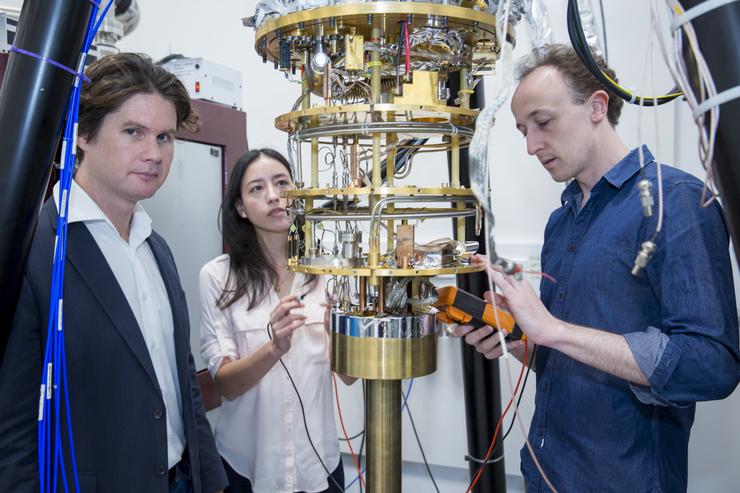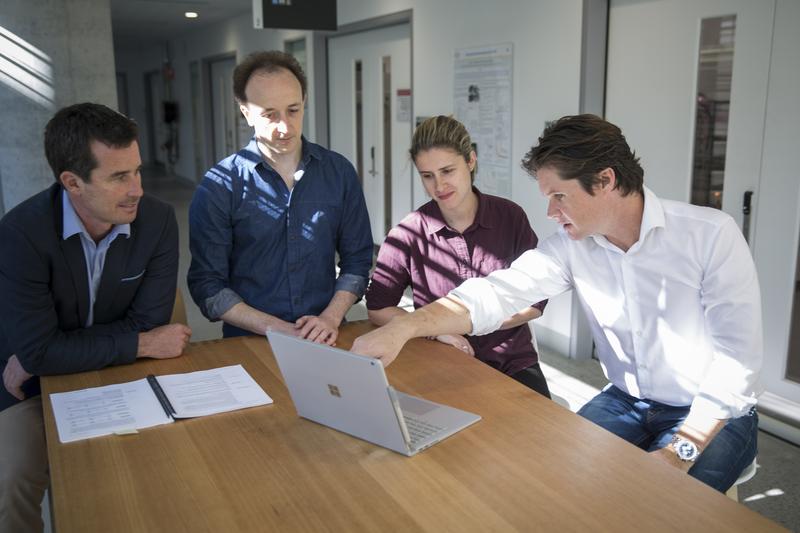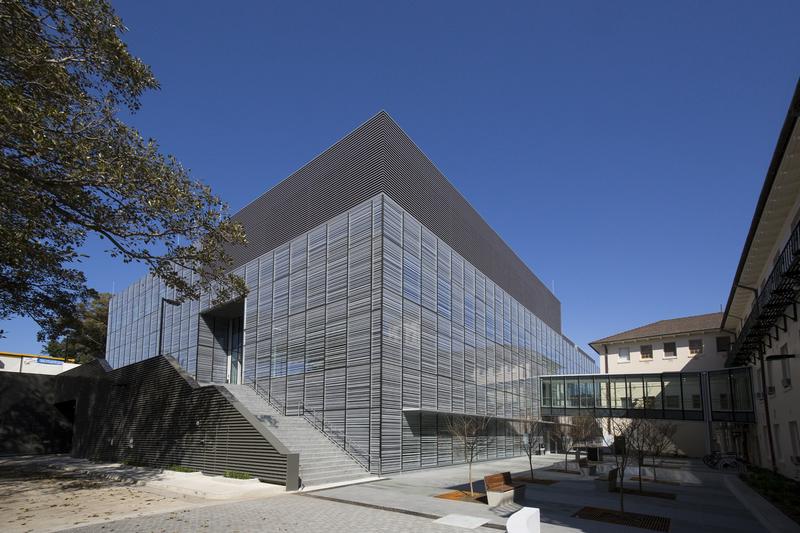
Prof David Reilly, PhD candidate Alice Mahoney and postdoctoral researcher Dr John Hornibrook
Microsoft today cemented its long-standing quantum computing research relationship with the University of Sydney, with the signing of a multi-year investment deal understood to be in the multiple millions.
The Australian arm of Microsoft’s global Station Q quantum computing laboratory network will be housed within the university’s $150 million Sydney Nanoscience Hub, which opened last year.
Microsoft will be providing scientific equipment to the lab, as well as funds for additional staff and specific research projects. The exact value of the investment has not been disclosed.
Leading the lab is its scientific director Professor David Reilly, who, after working as a consultant to Microsoft for a number of years, joined the company full time in October last year as one of four heavyweight academic hires.
“The deep partnership between Microsoft and the University of Sydney will allow us to help build a rich and robust local quantum economy by attracting more skilled people, investing in new equipment and research, and accelerate progress in quantum computing – a technology that we believe will disrupt the way we live, reshaping national and global security and revolutionising medicine, communications and transport,” Reilly said today.
Double-down
Microsoft is ‘doubling-down’ on its quantum computing effort, it says, ramping up research across the eight centres that form Station Q.
The company is pursuing a topological approach to forming quantum bits – qubits – using quasiparticles called non-abellian anyons.

According to Microsoft, topological qubits are better able to withstand heat and electrical noise, which allows them to remain in a stable quantum state for longer – one of the key challenges in producing a useable quantum computer.
Last year the company said it had reached an ‘inflection point’ in its research (despite researcher’s admitting they were only ‘pretty sure’ non-abellian anyons exist), and would now be switching focus from theory to engineering.
“We’ve reached a point where we can move from mathematical modelling and theory to applied engineering for significant scale-up,” Professor Reilly added.
As part of the ramp-up, in April, Microsoft said it was seeking to double the size of its Sydney Station Q quantum with 20 new hires.
Quantum computing had become an engineering race, Doug Carmean, partner architect at the Station Q facility at Microsoft’s Redmond headquarters, told CIO Australia.

“We’re looking for something that can eventually turn into full scale computer systems. The more that we’ve worked on and the more we understand the theory, the more confidence we get,” he said.
“That’s why it’s turned into this engineering race. You see Microsoft spending a significant investment on it. You see Google and IBM, you see governments like China investing. The EU has this one billion euro grand challenge. So somebody’s going to crack it. Somebody’s going to make it happen and I think it’s going to be us.”
IP principles
The University of Sydney said it had agreed ‘principles’ around the intellectual property research may generate.
Microsoft has been working with the university on quantum computing research for around five years. Today’s investment will not affect what papers the university’s researchers are able to publish.
“A lot of good science is not done because universities and their industrial partners have theoretical conversations about how the pie might be split before the pie is even baked or before anyone knows what a pie is,” said University of Sydney vice-chancellor, Dr Michael Spence.
“One of the things that has been creative about this relationship is we’ve agreed principles for the ways in which the IP should work... What’s been unusual for a process in which quite so many lawyers have been involved, is we’ve been keen to let science set the agenda. And not let those theoretical legal questions set the agenda, as has happened in so many industry-university partnerships that either fail or don’t get off the ground because of that.”
Microsoft added that the partnership supports "both open, discovery-led research and the development of a pathway to build and optimise commercial devices."

Today’s deal follows yesterday's announcement that the New South Wales government was creating a $26 million fund to support the commercialisation of the technology.
Part of that fund will be directed towards a rival effort to Microsoft’s Station Q; the Centre for Quantum Computation and Communication Technology (CQC2T), based at UNSW, where researchers from a number of Australian universities are pursuing a silicon-based approach to building qubits.
“It’s widely recognised globally that NSW is well and truly punching above its weight in the field of quantum computing, and the State Government is keen to ensure our researchers maintain their world-leading position in what’s being dubbed the new ‘space race’ - the race to build the world’s first quantum computer,” NSW Deputy Premier and minister for skills and small business John Barilaro said while announcing the fund.
Join the CIO Australia group on LinkedIn. The group is open to CIOs, IT Directors, COOs, CTOs and senior IT managers.
